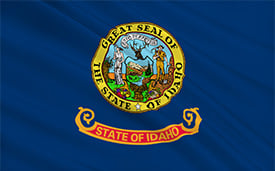By vetoing legislation today that would have allowed the Idaho State Treasurer to protect state reserve funds with a small allocation to physical gold and silver, Idaho Gov. Brad Little sent an ominous message to the state’s mining industry and investors.
Senate Bill 1314 – sponsored by Sen. Phil Hart and Rep. Barbara Ehardt – passed overwhelmingly in the Idaho State Senate before being approved by the House in late March, only to be vetoed by Gov. Little.
The House and Senate have the right to override the veto this week.
 Backed by the Sound Money Defense League and thousands of grassroots Idaho activists and taxpayers – as well as the Gem State’s mining industry – the measure would have enabled the Treasurer to acquire gold and silver for certain state reserve funds, helping Idaho hedge against the risks of inflation, debt default, and financial turmoil.
Backed by the Sound Money Defense League and thousands of grassroots Idaho activists and taxpayers – as well as the Gem State’s mining industry – the measure would have enabled the Treasurer to acquire gold and silver for certain state reserve funds, helping Idaho hedge against the risks of inflation, debt default, and financial turmoil.
Despite gold and silver’s significant current and historical value to Idaho, including its mining, refining, and bullion-related industries, Governor Little’s veto send an unmistakable message the State of Idaho does not support gold and silver — while affirmatively blocking the state from acquiring or holding these valuable monetary metals.
Little’s action leaves Idaho’s state funds unhedged and deeply vulnerable to currency and default risks, exposing Idaho’s multi-bullion-dollar reserve funds (comprised entierly of debt investments) to losses in real value from inflation.
Sen. Hart said, “Idaho is known as the Gem State and was first settled by miners. Historically, a reliance on gold and silver is part of our state’s DNA,” after receiving news of Gov. Little first veto of the session.
In sharp contrast to Idaho, Utah and many other states – with both Republican and Democrat governors – have embraced sound money, recognizing the growing problems of inflation and financial instability.
Under Idaho law, the State Treasurer has limited options for holding, managing, and investing state funds, making enabling legislation necessary. In fact, Idaho’s nearly $10 billion in “idle money” and other reserve funds are invested almost exclusively in treasuries, CDs, municipal bonds, corporate bonds, and agency debt.
These debt instruments carry risks – especially because they are not inflation-hedged and are therefore highly vulnerable to the steady erosion in the real value of principal, coupled with interest rates that are often negative in real terms.
SB 1314 would have permitted the Treasurer to hold up to 7.5% in state funds in physical gold and silver, so long as the assets are maintained securely in a depository specifically built for precious metals located within Idaho (or a contiguous state) or in an Idaho-charted bank or credit union.
An allocation to gold and silver fits squarely within the objective of protecting against financial risks and would logically be included on any list of safe and liquid investment options.
The monetary metals provide an important hedge against inflation, debt default risks, and stock market declines – and they have historically boosted overall investment returns while also reducing portfolio volatility.
Texas and Ohio have previously acquired gold. Meanwhile, legislation very similar to SB 1314 recently passed in Tennessee and Utah and is under consideration right now in Missouri and West Virginia.
Central banks worldwide have been stockpiling gold at record rates in recent years as concerns about the unbacked U.S. dollar have increased. Gold has recently reached a new all-time high priced in declining dollars.
Idaho is only ranked 12th on the Sound Money Index, with many of its neighbors ranked higher.
Just last month, Utah Governor Spencer Cox signed a similar gold reserves bill – which further directs the Treasurer to present additional legislative proposals this Fall after conducting a study “analyzing the role of precious metals in augmenting, stabilizing, and ensuring the economic security and prosperity of the state, the families and residents of the state, and businesses in the state.”
Sound money bills have been considered in two dozen other states this year, including Alaska, Indiana, Iowa, Georgia, Kansas, Kentucky, Michigan, Arizona, Utah, New Hampshire, New Jersey, Oklahoma, Nebraska, Kansas, Vermont, West Virginia, Wisconsin, and more.
********




